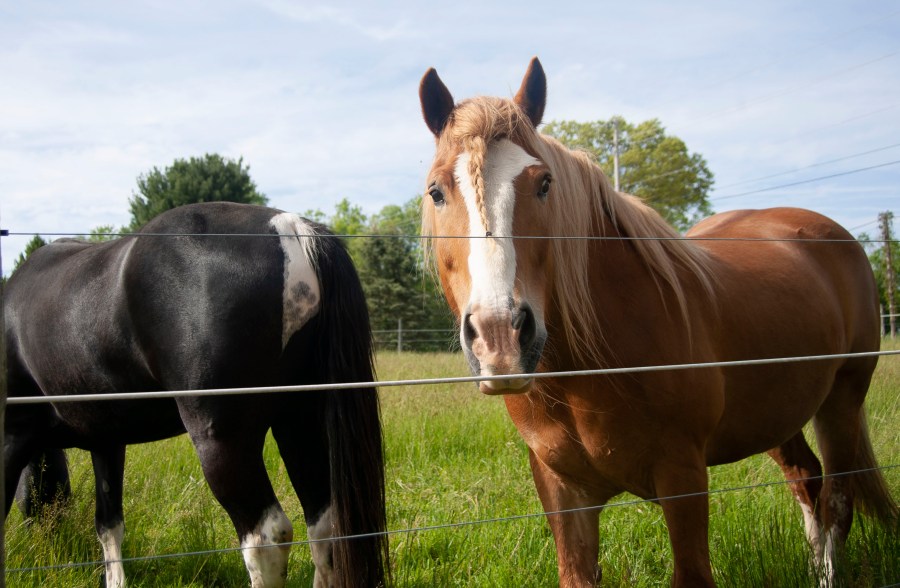East Palestine residents say train derailment made pets sick
- Some East Palestine residents say their pets fell ill after the derailment
- They believe the toxic chemicals are to blame, but they can't confirm it
- The Ohio Farm Bureau says livestock further from the site is OK

Linda Murphy pets her horses Burke and Apache on their East Palestine, Ohio, property Tuesday, May 16, 2023. Murphy said her horses both became ill or exhibited unusual behavior after a train derailment in their town released toxic chemicals into the surrounding area. (Katie Smith/NewsNation)
Testing on staging11
(NewsNation) — In the wake of the East Palestine, Ohio, train derailment, some residents who live near the wreck site say their animals became ill and, in at least one case, died.
Linda Murphy was at work when she learned officials were planning to conduct a “burn off” of the chemicals on board a Norfolk Southern train that derailed three days earlier.
One of her two horses, Burke, an at-times stubborn 17-year-old Haflinger Belgian Cross, refused to leave, but the situation was urgent, Murphy said. So when the cloud of smoke carrying toxic chemicals swelled over East Palestine, Murphy and her 11-year-old Tennessee walking horse Apache left town and Burke stayed behind.
When they returned, Apache appeared to be in good health. Burke, however, was uncharacteristically lethargic.
“He didn’t seem himself,” Murphy said. “I didn’t see any physical symptoms, but he just did not seem like his normal self at all.”
Soon after their return, Apache grew ill. His face swelled past the point of fitting in a holster and Murphy grew more concerned as Apache started exhibiting serious gastrointestinal issues.
“I went out to the stall in the morning and he was covered in diarrhea from rolling in the stall,” Murphy said. “He had dried sweat on his neck and chest and he just would not move.”
The veterinarian said Apache’s symptoms were “environmental,” Murphy said. On Tuesday, Apache was grazing in his pasture alongside once-again friendly and inquisitive Burke. For now, things seem to be back to normal, including for Murphy’s cats and dog who also had fallen ill after the crash, she said.

Murphy isn’t the only one who noticed a change in her animals’ health and behavior. After the chemical release that followed the Feb. 3 Norfolk Southern train derailment in East Palestine, resident Chase Kinder said seven of his sheep died.
“Just mysteriously from falling over dead,” Kinder said. “Randomly, seven of my sheep — so I’ve lost a little over 1/5 of my herd.”
Like Murphy, Kinder can’t be certain that the sheep’s deaths are directly tied to the derailment. Until he’s confident he can secure the kind of testing that might be able to confirm their cause of death in detail, Kinder is preserving their bodies in the freezer.
“I can’t really say for sure that the train crash is the reason because I just frankly don’t know for sure,” Kinder said. “Personally, I believe it had something to do with it. I’ve raised sheep for 20 years I’ve never seen anything like it.”

Nick Kennedy, senior organization director for the Ohio Farm Bureau said he’s heard the unfortunate stories about people’s pets. To his knowledge, testing efforts have targeted agriculture and livestock, much of which exists on farms miles away from the derailment, he said.
Kinder’s sheep and Murphy’s horses are their personal animals, meaning they aren’t selling them to the public for meat or dairy.
“Those folks that might have been in town, they’re a little closer to everything,” Kennedy said. “Thankfully, we’ve not had anything happen with any of our livestock owners.”
Kennedy didn’t discredit the derailment’s potential impact on pets and animals closer to town. But the derailment was something neither locals nor the farm bureau anticipated, and testing for potential contaminants in the water and soil that animals feed on will be an ongoing process, he said.
“We don’t know how long or if ever the chemicals are going to migrate through the ground, the water tables, things like that,” Kennedy said. “We just don’t… If I’m in this position in 20 years, I told my boss I think we’ll still be dealing with this in some capacity.”